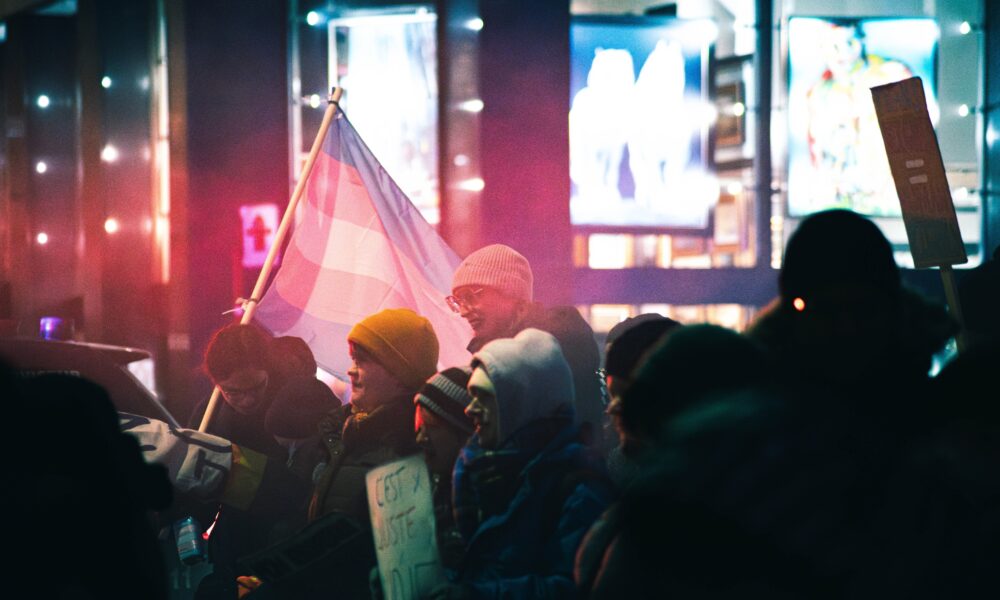Around 150 protestors from across Montreal gathered in front of the Palais de Justice Courthouse on Jan. 15 to oppose the Coalition Avenir Québec’s (CAQ) decision to delay adding the “X” gender category to official provincial IDs until 2025 or later. The “X” category is increasingly being recognized across the world as an alternative option to the male “M” and female “F” categories used to designate gender on official state documents and has been central within trans inclusion debates.
The protest was organized by Celeste Trianon, transfeminist activist and executive director of Trans Legal Collective, a clinic working to support people through the process of changing their gender marker or legal name. The protest marked the start of the organization’s new campaign in response to the CAQ’s inaction on trans rights.
On Jan. 28, 2021, the Quebec Superior Court forced Quebec to reword sections of the province’s Civil Code after ruling that certain sections were discriminatory toward trans and non-binary people. The court also concluded that non-binary people would be able to change their gender on official birth documents within Quebec and that “X” would be an option on government-issued IDs.
The protest kicked off at 4 p.m. with chants targeted towards the Quebec government and protesters roaring, “Stand up, fight back.” The protest then moved onto St. Laurent Blvd. at 4:30 p.m., heading downtown along Sherbrooke, followed by a large police presence.
Protesters voiced frustrations over the delay in adding the “X” gender category and the lack of trans representation within the Comité de sages sur l‘identité de genre—the government committee formed in response to the turbulent nationwide debates over schools’ teaching of gender identity and sexuality in Sept. 2023. The government created the committee to contribute to LGBTQ+ policy formation, with significant influence over the “X” gender marker debate.
In an interview with The Tribune, Trianon described frustration over the lack of trans representation on the committee, which she views as strategic.
“The Comité de sages does not contain any trans people, nor experts, nor people who are actually concerned by the issues—such as parents of trans youth,” Trianon said. “We are talking about a committee that is designed to purposely be anti-representative, to reject the fact that trans people have autonomy and have dignity. We are also denouncing the fact that […] the government […] is taking action to specifically […] block individuals from accessing identification documents that align with their gender [….] This makes us last within all the provinces, and clearly violates both the Quebec and Canadian Charter.”
Lack of representation within the committee was just as concerning for Aurora Knaut, a protestor at the event, who described the “X” category delay to be a sign of what is to come.
“The fact that they are the ones making policy on our behalf [means] that it won’t just be an ‘X’ that takes longer. It will also be trans health that gets less money, as it is deemed less important.” Knaut said.
For many, the event was a way to express the personal impact of political decisions being made by the government on 2SLGBTQIA+ rights. Tristan Clarke-Cousineau, U3 Arts, said their involvement in the protest was the result of continual disappointment in the decision-making process. Having lived in Montreal for many years, they expressed frustration over the dehumanization of the debate in recent years.
“[We want to] show the legislators and policymakers […] in Quebec that people care about this issue, and that it affects real humans,” Clarke-Cousineau said in an interview with The Tribune. “It’s not just a cultural debate to be had on the world stage. [The Quebec Government] can’t use us […] as political pawns.”
Trianon also expressed that community building and protesting will continue to be integral for strengthening the political statements in support of 2SLGBTQIA+ rights within Montreal.
“This [protest] is not just about trans people themselves; [it is about] whether we still even have a human rights paradigm here in Quebec,” Trianon said.








